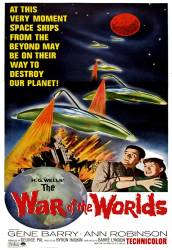Corrected entry: At the beginning of the movie, a narrator explains why the Martians considered Earth the place to inhabit and not the other planets in our solar system. For some reason, he leaves out Venus.
Correction: The narration also states that Uranus and Neptune are in eternal night - which is not correct. They receive sunlight just like all the planets. So they do have sunlit hemispheres. The narration was correct that they are ultra-cold worlds, though.
Corrected entry: The first appearance of the Martian machinery is the 'Cobra head/Skeleton Ray' that appears from out of the cylinder after the top unscrews and falls to the ground. The size of the hole that the 'Cobra' is protruding through is far too small for the remainder of the Martian war machine to have been able to exit from.
Correction: We don't know how the vessel was assembled. It could be designed to split in half, and the small hatch was for scouting the area before the alien ship emerged from the vessel.
If that were the case, then the Martian hover tank couldn't have fired its laser at the three men posted to watch the first meteor.
Corrected entry: Gene Barry swings an axe at a Martian camera (tri-lens) without ever touching it and yet it falls down. He does strike a beam just to the right of the camera which is at the same level and then they both fall at the same time - how convenient. (00:51:20)
Correction: This is not a mistake. When the professor swings the axe it knocks down the beam, which traps the Martian camera's neck. While the neck is trapped he dismembers it with the axe.
Corrected entry: All the people begin leaving the church after the Martian saucer crashes. How did they all know it was safe to go outside within moments after the crash? (01:22:15)
Corrected entry: In the scene where Gene Barry and Ann Robinson are taking refuge in the house, a meteor hits the house, they recover, and act like nothing is wrong. Yet earlier in the movie, it was said that when the meteors first crashed they were too hot to get close to.
Correction: If you watch the scene, the 'Meteor' skids along the ground and builds a pile of earth between it and the house. Soil is actually quite a good thermal insulator, so its possible the earth bank shielded them.
Corrected entry: Martians die at the end of the film because of the bacteria in our atmosphere. Martians are living organisms (they had anemic blood in the movie), so why weren't humans affected adversely by the Martian bacteria?
Correction: Perhaps the human immune system is better at killing them than the Martian immune system (if there is such a thing) is at dealing with Earth bacteria.
Correction: The Martians hadn't been on Earth long enough to spread any alien germs. The invasion unfolded rather quickly. The aliens were mostly confined to their space ships, and had limited direct contact with humans. If they had survived longer, they might have spread fatal organisms to humans, though the humans probably would have been eradicated by then.






Correction: The narrator never says "solar system" but that the Martians looked "across space", so leaving out Venus means nothing. After naming Mercury the narrator says "of all the worlds the Martians could see and study..." suggesting that more than just Venus was left off the list of worlds Martians looked at.
Bishop73